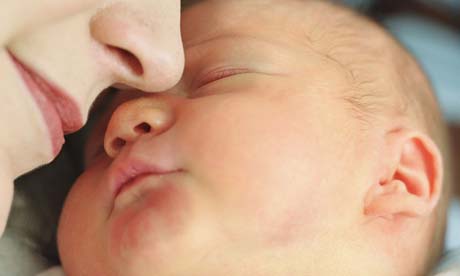
More women should endure the agony of labour because pain-relieving drugs, including epidural injections, carry serious medical risks, diminish childbirth as a rite of passage and undermine the mother's bond with her child.
These claims from Dr Denis Walsh, one of the country's most influential midwives, have prompted a furious reaction, with other experts saying he has exaggerated the risks of having an epidural. Official figures show that the number of mothers-to-be who receive an epidural, general or spinal anaesthetic has soared in recent years to 36.5%.
Walsh, a senior midwife and associate professor in midwifery at Nottingham University, argues that many women avoid experiencing the discomfort of childbirth because hospital maternity staff are too quick to offer an epidural or agree to a woman in labour's request for a pain-killing injection in her back to ease her suffering.
"A large number of women want to avoid pain. Some just don't fancy the pain [of childbirth]. More women should be prepared to withstand pain," he told the Observer. "Pain in labour is a purposeful, useful thing, which has quite a number of benefits, such as preparing a mother for the responsibility of nurturing a newborn baby."
Celebrity births, television portrayals of labour as a highly medicalised process and films such as Knocked Up have added to a culture where pain relief seems normal, even though labour pain is natural, healthy and temporary, he said.
"In the west it has never been safer to have a baby, yet it appears that women have never been more frightened of the processes," Walsh said. He has set out his controversial views in an article for the journal Evidence Based Midwifery, which is published by the Royal College of Midwives (RCM).
In a sharply worded critique of the rising popularity of pain-free labour, Walsh warns that normal birth is in danger of being "effectively anaesthetised by the epidural epidemic" in the NHS. A widespread "antipathy to childbirth pain" has emerged in the past 20 years and combined with increased patient rights and risk-averse doctors to create a situation where almost all hospitals now offer epidurals on demand, even if that is not in the mother's or baby's interests.
The NHS should abandon routine pain relief and embrace a new "working with pain" approach which would encourage women to use yoga, hypnosis, massage, support from their partners, hydrotherapy and birthing pools as natural ways of alleviating their pain, he said.
"Over recent decades there has been a loss of 'rites of passage' meaning to childbirth, so that pain and stress are viewed negatively," said Walsh. Patients should be told that labour pain is a timeless component of the "rites of passage" transition to motherhood, he added.
The number of women having an epidural has jumped from 17% in 1989-90 to 33% in 2007-08, said Walsh, despite medical risks such as a prolonged first and second stage of labour, a heightened chance of the baby's head being in the wrong place and lower rates of breastfeeding. He claims that:
• 20% of epidurals are given to women who do not need them
• "Emerging evidence [shows] that normal labour and birth primes the bonding areas of a mother's brain better than caesarean or pain-free birth"
• Pain prepares women for the demands of motherhood
• An epidural makes a mother more likely to need help in getting her baby out, such as by using forceps, which can be traumatic for both mother and child.
Sally Russell, co-founder of the Netmums website, said Walsh was talking "absolute rubbish". His comments were unhelpful to women who needed pain relief, she said. "What he is promoting suggests to me that women who can't go through normal birth for whatever reason find they are stigmatised and made to feel they have let themselves down because there's such pressure to have a normal birth, and that's very damaging."
Dr Justin Clark, a senior obstetrician and gynaecologist at Birmingham Women's Hospital, also rejected Walsh's claims: "He's exaggerating the risks of epidurals. They aren't overused. In the main they're a good thing and almost always necessary, for example when there are complications, like a breech delivery or a prolonged induction, where the woman will get tired. It would be wrong to suggest that modern women are somehow less stoical than in the past."
Cathy Warwick, the RCM's general secretary, said the number of mothers-to-be demanding pain relief due to anxiety at not getting one-to-one personal care from a midwife showed that, if NHS maternity services did more to support them, then the "unnecessarily high" incidence of epidurals would be reduced.
But Mary Newburn of the National Childbirth Trust, the parenting charity, said Walsh's comments were timely and important. She blamed inadequate antenatal education, lack of midwife-run birth centres and the fact that 93% of births happened in hospital for creating the "epidural culture".
'My birth plan just said: epidural'
Mothers' experiences of pain relief.
"I knew I wanted every pain relief going. I would rather be happy than suffer. I had gas and air, pethidine and then the epidural, which was bliss."
Gail
"I had paracetamol, then was induced with Syntocinon at 7am and managed with paracetamol until 2pm, then went on to a pain-relieving machine till 4pm, then to pethidine. No epidural was needed."
Maxine
"My original birth plan just said: 'Epidural'. Nobody should feel guilty or that they're not a proper woman if they have pain relief during labour."
Claire
"My second labour was agony. If I could have nicked the keys to the controlled medicines cabinet I would have."
Su
Source: Observer survey thread at netmums.com.

